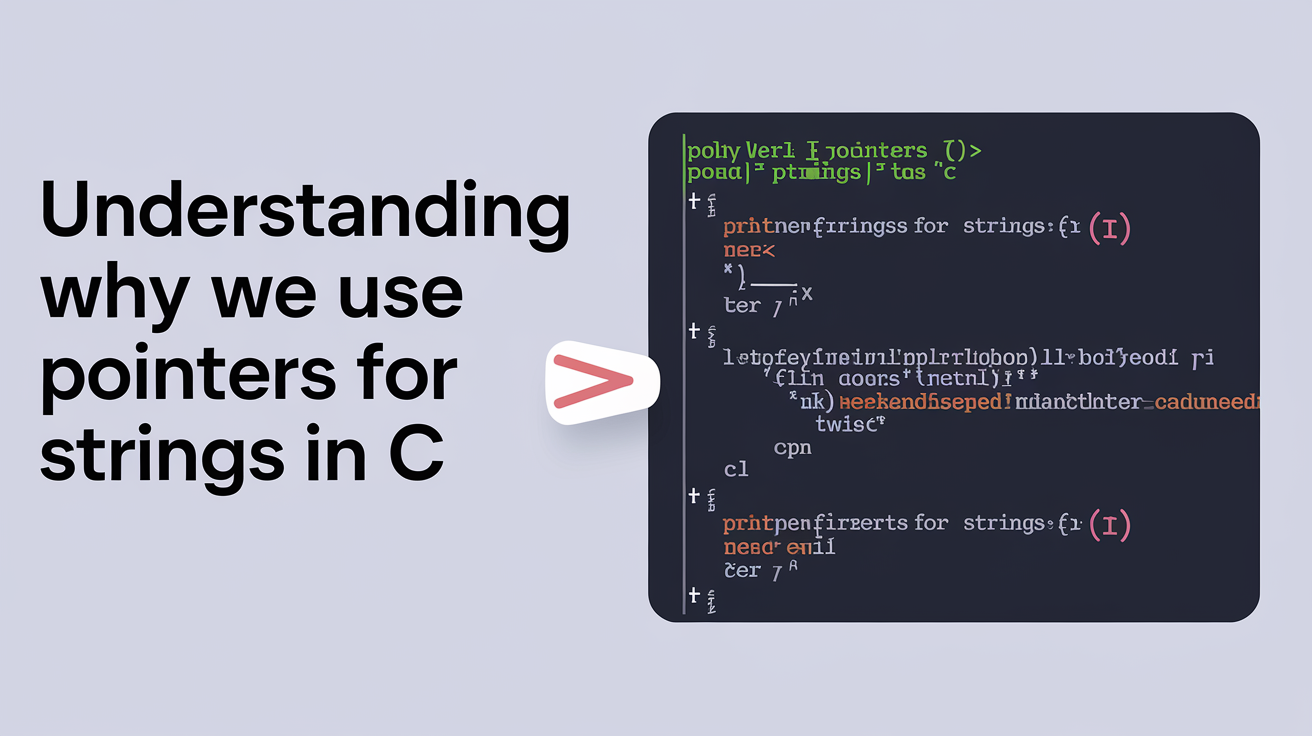The Importance of Pointers for Strings in C Programming
 Zouhair Grir
Zouhair Grir
When working with C, one of the core aspects you'll encounter is how data is passed to functions. Specifically, when dealing with strings, you'll see a common pattern like this:
size_t ft_strlen(const char *str);
In this blog, we’ll break down why we use const char * when passing strings and how pointers work in function parameters. If you’re diving into C programming and wondering about pointers, const correctness, and efficient memory use, this guide will help clear things up!
How Data is Passed to Functions in C
In C, there are two primary ways to pass data to a function:
Pass by Value (Making a Copy)
When you pass a variable to a function by value, C makes a copy of that data. This means that any changes you make inside the function don’t affect the original value outside of it.
void modify(int x) { x = 5; // Changes the local copy of `x` } int main() { int a = 10; modify(a); // The value of `a` is copied into `modify()` // `a` is still 10 here because only the copy was modified }
Pass by Reference (Using Pointers)
When you pass a pointer to a function, you’re giving the function the memory address of the original variable. This allows the function to directly modify the original data, without making a copy.
For strings, this is especially important. In C, strings are essentially arrays of characters. Passing an entire array (the whole string) to a function would involve copying all the characters, which is inefficient. Instead, we pass a pointer to the first character of the string.
void modifyString(char *str) {
str[0] = 'H'; // Modifies the original string
}
int main() {
char myString[] = "hello";
modifyString(myString); // Passing the memory address of `myString`
// Now, `myString` is "Hello" because the function modified the original string
}
By passing a pointer to the string (char *), we give the function direct access to the original string, allowing it to modify it.
Why Not Always Modify Strings? Enter const char *
In many cases, we want to pass a string to a function without allowing it to be modified. For example, if you're writing a function to calculate the length of a string, there's no need to change the string, only to read it.
This is where const comes in. The keyword const tells the compiler that the data the pointer refers to cannot be modified. This ensures the integrity of the data while allowing the function to work with the original string in memory.
size_t ft_strlen(const char *str) {
size_t length = 0;
while (str[length] != '\0') {
length++; // Just reading the string, not modifying it
}
return length;
}
In this case, const char *str tells the function to only read the string, preventing accidental modifications. This practice, known as const correctness, is a great way to make your functions safer and more predictable.
Benefits of Using Pointers for Strings
Efficiency:
Passing a pointer to a string is much faster and more efficient than copying an entire string. You’re only passing a memory address (a small, fixed size), not the entire array of characters.Control Over Data:
By usingconst, you can control whether the function is allowed to modify the original data. If you want to modify it, don’t useconst. If you want to ensure the data remains unchanged, useconst char *.Direct Access:
With pointers, the function works directly with the original data, which is crucial when you need to modify or inspect it in place, like when manipulating strings or working with large data structures.
Conclusion
Next time you see a function like size_t ft_strlen(const char *str), you’ll know why the pointer is there and what const is doing to protect the data. Embrace these concepts as they are key to mastering C programming!
Subscribe to my newsletter
Read articles from Zouhair Grir directly inside your inbox. Subscribe to the newsletter, and don't miss out.
Written by

Zouhair Grir
Zouhair Grir
I'm GRIR Zouhair, a dedicated and experienced Full-Stack Developer from Morocco. With a strong passion for coding and a knack for solving complex problems, I excel in creating robust and scalable web applications. My expertise spans across both front-end and back-end technologies, allowing me to deliver comprehensive and seamless solutions.